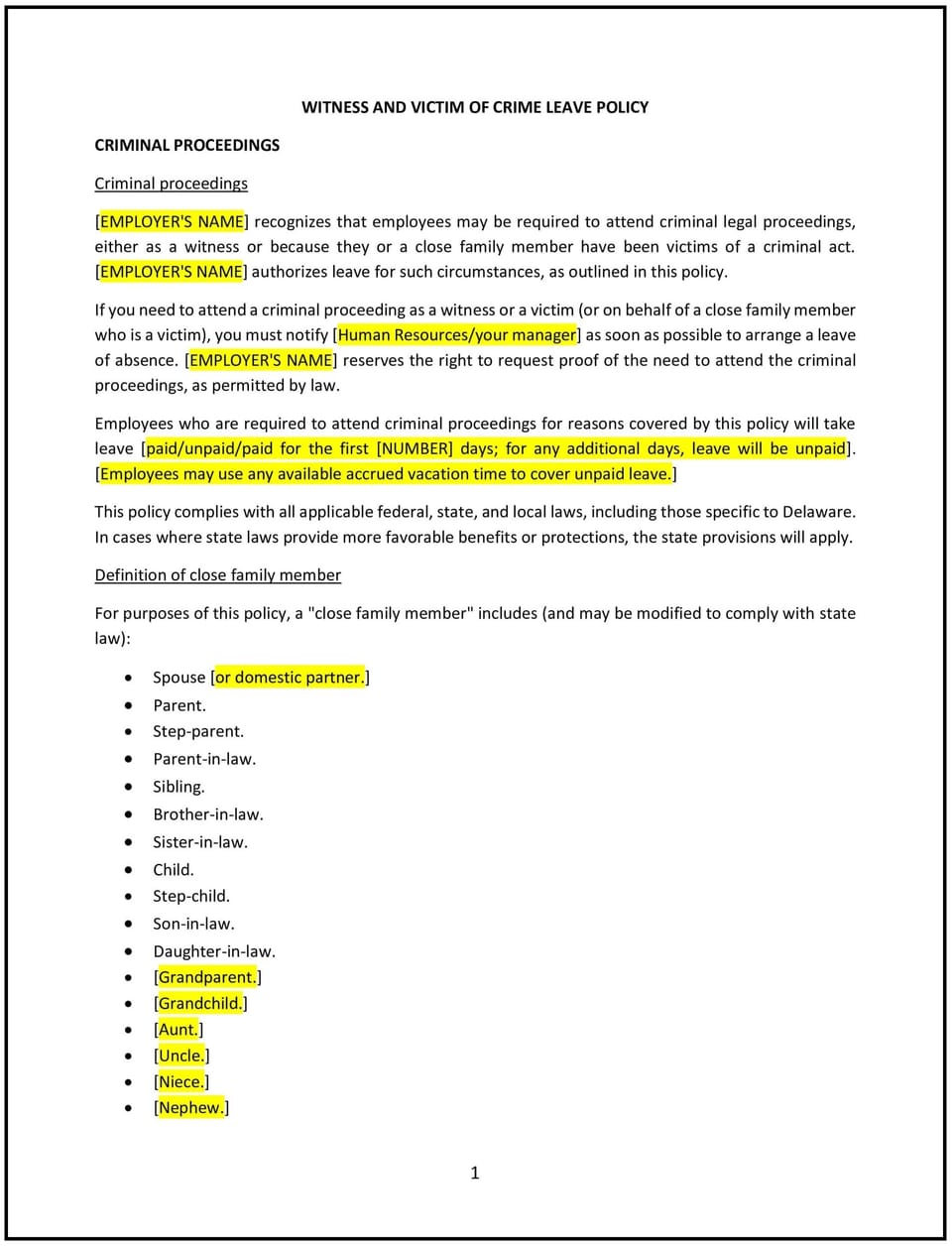Witness and victim of crime leave policy (Delaware): Free template

Witness and victim of crime leave policy (Delaware)
A witness and victim of crime leave policy helps Delaware businesses provide employees with time off to fulfill their legal obligations or recover from a crime-related incident. This policy outlines eligibility, procedures for requesting leave, and job protection measures, ensuring compliance with Delaware and federal laws while supporting employees during challenging times.
By implementing this policy, businesses can demonstrate empathy, foster trust, and ensure workplace continuity.
How to use this witness and victim of crime leave policy (Delaware)
- Define eligible circumstances: Specify situations that qualify for leave, such as attending court as a witness, participating in legal proceedings, or recovering from a crime-related incident.
- Outline eligibility: Clarify which employees are eligible for leave based on their employment status (e.g., full-time, part-time).
- Establish leave request procedures: Provide steps for employees to request leave, including advance notice and required documentation, such as subpoenas or police reports.
- Address leave duration: Specify the amount of time employees can take off and any conditions for extending the leave.
- Ensure job protection: Emphasize that employees’ jobs are secure during approved leave and that they will not face retaliation for taking leave.
- Promote confidentiality: Highlight that all leave requests and related information will be handled discreetly and shared only with authorized personnel.
Benefits of using this witness and victim of crime leave policy (Delaware)
This policy offers several benefits for Delaware businesses:
- Ensures compliance: Aligns with Delaware and federal laws that mandate job-protected leave for witnesses and victims of crimes.
- Supports employee well-being: Provides time for employees to fulfill legal obligations or recover from crime-related incidents without workplace stress.
- Promotes workplace trust: Demonstrates the company’s commitment to supporting employees during challenging times.
- Reduces legal risks: Establishes clear procedures for managing leave requests, minimizing the potential for disputes.
- Maintains continuity: Balances employee support with operational needs by outlining clear leave processes.
Tips for using this witness and victim of crime leave policy (Delaware)
- Communicate the policy clearly: Ensure employees understand their rights, eligibility, and the procedures for requesting leave.
- Train managers: Provide training on handling leave requests with sensitivity and in compliance with Delaware laws.
- Encourage timely notice: Ask employees to notify their managers as soon as possible when they need leave to ensure proper planning.
- Maintain documentation: Keep accurate records of leave requests, approvals, and supporting documents to ensure transparency and compliance.
- Review regularly: Update the policy as needed to reflect changes in Delaware laws, legal obligations, or workplace needs.
Q: Why is a witness and victim of crime leave policy important for my business?
A: This policy ensures compliance with legal requirements, supports employees during difficult times, and fosters a supportive workplace culture.
Q: What circumstances qualify for leave under this policy?
A: Eligible circumstances include attending court as a witness, participating in legal proceedings, or recovering from a crime-related incident.
Q: What documentation is required to request leave?
A: Employees may need to provide documentation, such as a subpoena, police report, or court order, as outlined in the policy.
Q: Are employees’ jobs protected during this leave?
A: Yes, employees are guaranteed job protection during approved leave and cannot face retaliation for fulfilling their legal or recovery obligations.
Q: How often should this policy be reviewed?
A: This policy should be reviewed annually or whenever Delaware laws, company practices, or legal obligations regarding leave change.
This article contains general legal information and does not contain legal advice. Cobrief is not a law firm or a substitute for an attorney or law firm. The law is complex and changes often. For legal advice, please ask a lawyer.


